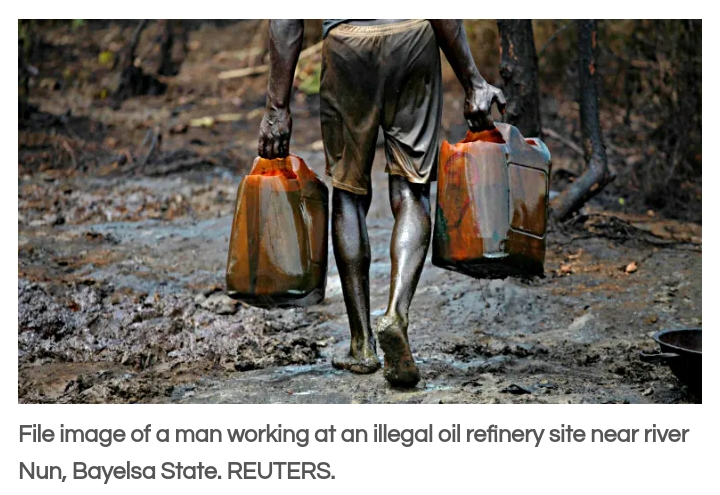
THERE are indications that despite the rise in crude oil prices in the international market, Nigeria’s economy may not reap the benefits due to the continued increase in theft and pipeline vandalism estimated to have gulped 73 million barrels a year.
Investigations by Sunday Vanguard revealed that the country loses about $7.3 billion a year to oil thieves and vandals. The situation is made worse by the country’s inability to meet the Organisation of Petroleum Exporting Countries, OPEC’s production quota of 1.8 million barrels per day which resulted in the Federal Government recently announcing a reduction in her export target to 1.6 million barrels per day while other countries in the cartel are striving to exceed their quota.
According to the GMD, Nigerian National Petroleum Corporation (NNPC), Mr Mele Kyari, the country loses an average of 200,000 barrels of crude per day to oil thieves, translating to 73million barrels in a year. Using an average crude oil price of $100 per barrel, Nigeria is losing over $7.3 billion in a year or in five years (between 2016 and 2020) an estimated $14.65 billion considering the cost of oil per barrel at the years under review.
The amount, when converted using the official N416.25 to dollar exchange rate, translates to N3.038trn loss in a year. Data from the latest report by the Nigeria Extractive Industries Transparency Initiative (NEITI) Oil and Gas Industry showed that 272.2 million barrels (mmbbls) of crude were lost to oil theft and other forms of criminalities in Nigeria’s midstream sector.
Economy shortfalls
The issue of crude oil theft and sabotage has become endemic despite several initiatives and recommendations made by oil and gas experts to curb the menace. Worse still, the implications surpass losses to government revenue extending to environmental degradation, health challenge and deaths due to fire disasters including the proliferation of arms as the case may be.
Nonetheless, the losses defer from situations where oil companies are unable to produce at a particular period due to time spent repairing vandalised pipelines or leaks, often described as deferment. This development has cost the country’s economy a lot as some major multinational oil companies operating in Nigeria have linked their divestment in many onshore assets to the continued oil theft in the country.
On OPEC’s quota, despite its requirement of 1.8 million barrels from Nigeria, in the last few years, the country has struggled to produce between 1.3 and 1.4 m/d. In January it recorded a 1.399 million barrels production level, 1.258m/d production in February, dropping to 1.238 million in March.
A report released last month during a meeting on crude oil theft between the Nigerian Upstream Petroleum Regulatory Commission and Oil Producers Trade Section, as well as the Independent Petroleum Producers Group, shows that between January 2021 and February 2022, Nigeria lost $3.2bn to crude oil theft.
The report reveals that oil theft rose significantly between 2021 and 2022, with over 90 percent of total crude produced at the Bonny Terminal stolen in January 2022.
Contraption
Meanwhile, critics have faulted these figures, saying it is an attempt to cart away the country’s crude under the guise of oil theft. Contrary to the acclaimed huge losses of over 80 percent painted by operators in the petroleum industry, the Federal Government, according to them, has, through the Nigerian Upstream Petroleum Regulatory Commission (NUPRC) revealed that Nigeria loses only 7.6 percent and not 80 or 90 percent of its net crude production daily to oil theft and vandals. The Commission’s Chief Executive Officer, Gbenga Komolafe, warned that such unsubstantiated figures could encourage falsification of figures by producers and industry regulators.
Vanguard


